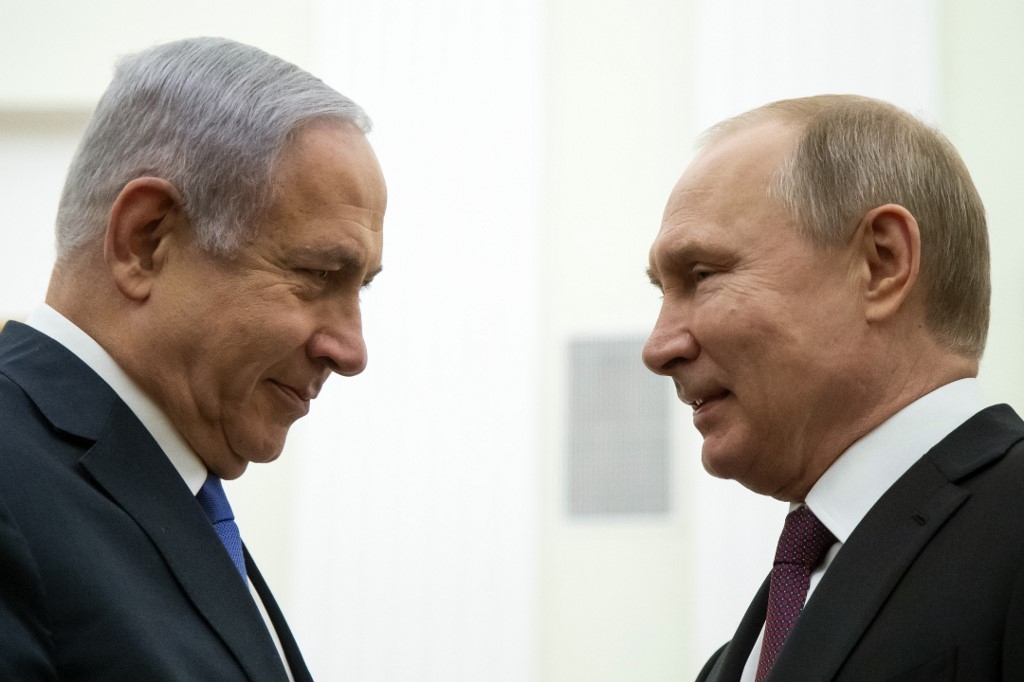Israeli elections: How Russia could help Netanyahu win

It’s hard enough for Israeli Prime Minister Benjamin Netanyahu’s political opponents to run against him in Tuesday's election.
After all, the Israeli leader is a wily street fighter and master tactician who is running for a fifth term as premier. But even more formidably, the chief opposition candidate, Benny Gantz, is also fighting an entire country - Russia, which appears to have thrown its full weight behind its preferred candidate.
The Russian president, Vladimir Putin, and Netanyahu have developed strong ties over many years, with the Israeli leader making frequent visits to Moscow to smooth over tensions and strengthen the relationship, despite Russia's close ties with Israel's regional nemesis, Iran, and its ally Syria.
This is now paying dividends for Netanyahu, in more ways than one.
Last week, Putin pulled a rabbit out of his hat for his friend, Netanyahu, when he delivered the body of an Israeli soldier killed in Lebanon in 1982
Shin Bet chief Nadav Argaman has warned, in an extraordinary statement, that a foreign government was seeking to interfere in the upcoming election. Though he didn’t specify which country, Israeli media widely speculated that he was referring to Russia.
New MEE newsletter: Jerusalem Dispatch
Sign up to get the latest insights and analysis on Israel-Palestine, alongside Turkey Unpacked and other MEE newsletters
Last week, Putin pulled a rabbit out of his hat for his friend, Netanyahu, when he delivered the body of an Israeli soldier killed in Lebanon in 1982. Zachary Baumel, also a US citizen, died in a major battle between Israeli and Syrian forces that killed 30 Israelis. Apparently, his body was spirited out of Lebanon and delivered to Syria.
The Israeli military censor refused to permit any journalist to report on Russia's involvement, until Netanyahu was en route to Moscow to personally thank the Russian president for his services.
The benefits Netanyahu derives from the relationship with Putin are clear: a back channel to restrain his enemies, Hezbollah and Iran, as their power in Syria ramps up, and the prestige of rubbing shoulders with one of the world’s most powerful leaders.
Hidden benefits
All this counts for votes among the Israeli electorate, and those are what Netanyahu needs.
As for Putin, perhaps he recognises that it makes sense for him to protect his own assets in Syria by maintaining close ties with Israel.
Gantz has not ruled out the possibility of collaboration between the Kremlin and Netanyahu in the mobile phone incident
The historic and cultural links between the countries date back to the collapse of the Soviet Union, with more than a million former Soviet Jews emigrating to Israel, making Russian the first language for 12 percent of the population (the highest after Hebrew and Arabic).
Not surprisingly, many Israelis maintain strong personal and family ties with the former homeland. Israel is the only country outside the former Soviet bloc that celebrates the 9 May Soviet victory over the Nazis, with Netanyahu a guest in Moscow for last year's victory parade.
According to some analysts, Putin saw the hostility of the Soviet Union to Israel and suspicion of its Jewish population as a strategic mistake that he does not want to repeat.
One of the possible hidden benefits of good relations could be intelligence sharing and the leaking of critical information via Israel's intelligence apparatus on US intentions in the region.
'Irritating and unprofessional'
Not only are the Russians scheming on Netanyahu’s behalf, so is the military censor. The rules governing censorship, such as they are, declare that it is to be invoked only in cases where media reporting would endanger national security.
Suppressing political news on behalf of a powerful prime minister is not part of the protocol, journalist Yossi Melman noted in a since-deleted tweet: “This is irritating and unprofessional and damages trust in the fairness and integrity of these bodies.”
Meanwhile, one of the most bizarre claims levelled against Gantz, the leader of the Blue and White coalition, is that Iranian intelligence purportedly hacked his mobile phone and gained access to all of its contents.
The Iranians denied any role in the alleged hacking, and news reports subsequently blamed Russian hackers, either working independently or on behalf of the Russian government.
“Was Iran behind the phone hack or was it possibly someone else?” asked the Jerusalem Post's security correspondent. “Russia has a history of engaging in this kind of activity, oftentimes for the sole purpose of destabilizing a democracy and causing electoral chaos.”
Gantz has reportedly not ruled out the possibility of collaboration between the Kremlin and Netanyahu in the mobile phone incident, saying if the Iranians were not behind it, there was a chance Netanyahu could have used the Russians “to interfere in the elections”.
Putin is smart enough to understand that if Russian operatives were involved, his government couldn’t be seen to be directly implicated. Former Prime Minister Ehud Barak, writing of a meeting he had with Israeli cyber-experts, said the original hackers could have retrieved the data and offered it on the dark web, from where it could have easily been transferred to Iranian intelligence.
Israeli intelligence would probably have picked up any communications among the Iranians, alerting them to the presence of Gantz’s phone data.
Massive smear campaign
Late last month, an Israeli cyber-initiative exposed a massive social media campaign, allegedly led by the Likud party, to smear Blue and White. It identified hundreds of accounts that were suspected to be fake, spreading campaign propaganda targeting Gantz and other political rivals.
An Israeli operative was identified as the apparent ringleader of the effort. Twitter has since deleted many of the suspect accounts.
This type of campaign trickery echoes Russian cyber-operations against the Democratic National Committee and Hillary Clinton during the 2016 US election.
Although Russia wasn’t necessarily directly involved in the Israeli social media effort, Likud would have learned lessons from Russia’s Fancy Bear operation in attempting to penetrate email servers and create thousands of fake accounts to spread lies and propaganda designed to damage the opposition.
Unfortunately, these dirty tricks may work. In the most recent Yedioth Ahronoth election poll, Blue and White retains a four seat lead over Likud - but that still may not be enough to form a governing coalition, as combining the centre-left parties would only secure 57 seats.
A right-wing coalition would give Netanyahu a 63-seat majority in the Knesset, ensuring he becomes the longest-serving Israeli premier in history. And Moscow will no doubt be happy about that.
The views expressed in this article belong to the author and do not necessarily reflect the editorial policy of Middle East Eye.
Middle East Eye delivers independent and unrivalled coverage and analysis of the Middle East, North Africa and beyond. To learn more about republishing this content and the associated fees, please fill out this form. More about MEE can be found here.







